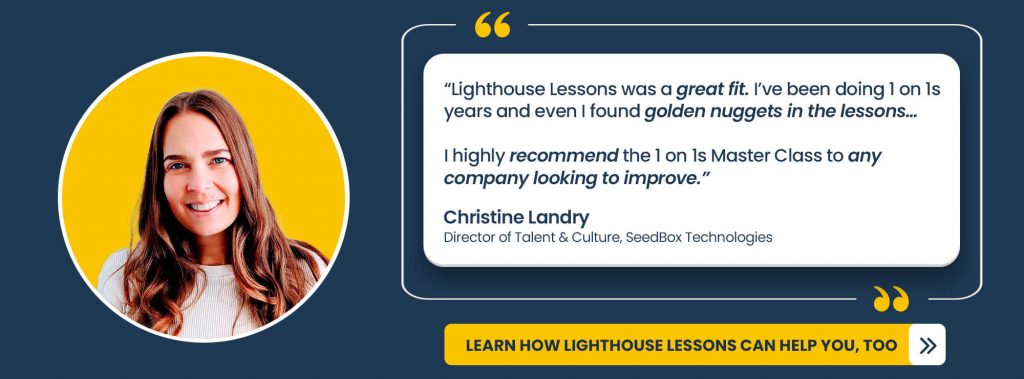Thought about starting one-on-ones, but not sure where to begin? Skeptical about the value of one-on-ones? Want to simply improve how they go? Today is your lucky day.
Yesterday, we teamed up with the awesome people at KISSmetrics to put on a webinar on one-on-ones and below we have the slides and the recording you can check out.
Whether you're just starting out as a manager or a seasoned pro, you're bound to learn a few things you can use to improve your working relationship with your team. These slides and the webinar are a compilation of everything I've learned about one-on-ones since I started Lighthouse and feature the thoughts of some of the best thought leaders on this subject like Andy Grove of Intel, Ben Horowitz of A16Z, Ed Catmull of Pixar, Jason Lemkin of SaaStr, and serial entrepreneur Michael Wolfe.
If you have questions or feedback you would have asked live, please leave a comment at the bottom of this post.
The Webinar Recording:
Note: A couple of the early links got mixed up by Bit.ly, so you can see the full collection of links from the webinar here: https://bit.ly/1on1WebinarLinks
The links were corrected before uploading to Slideshare.
The Slides:
A few highlights from the One-on-Ones Webinar Q&A:
- Remote teams: One-on-ones are a critical part of managing a remote team well. There's a lot of communication lost out on when you're not in the same office and the best way to make up for it is with video calls in your one-on-ones with your remote team. This will ensure no one feels out of the loop, lonely, or disconnected.
- Email is not a one-on-one: There are plenty of good things to communicate over email, but the topics of one on ones are better discussed face to face (or face to video) and in real time. This ensures you can dig into the problem and actively find solutions. It's too easy to be misunderstood over email or have the discussion get lost in an overflowing inbox even when it was really important to them.
- Helping with personal issues: Becoming a manager means you're in the people business. We're all human and sometimes things go wrong. There are divorces, deaths of loved ones, sick children, break ups, apartment drama, car troubles, and more. Show a little empathy and understanding when people need some compassion and a little extra help will go a long way to gaining the loyalty and long term commitment of your people.
Are you and your managers wasting their 1 on 1s?
There is no greater investment to make in your team than having 1 on 1s. Yet, done poorly they’re a huge waste of time.
That’s why we made the 1 on 1 Master Class. You and your fellow managers learn step by step how to supercharge these meetings to motivate your teams, fix problems, coach your people, and much more.
You can learn how Lighthouse Lessons can help your leaders like we helped SeedBox Technologies by signing up here.






